Introduction
Politics of the MENA region (Middle East and North Africa).
Foundation
Post-WW I.
Effects
- Ottomans defeat.
- Collaboration with UK to form Arabic Kingdom.
- Division into independent states.
Post-WW II Effects
- Betrayal.
- Democracy and communism.
- Positive influence of cold war (Economic and political stability).
Notes
History is complete with political hiccups behind it. This paper covers an evaluation on the international politics of the MENA region alongside discussions on the history behind its political platform.
The foundation of the politics around the MENA region was post-World War I where the Ottomans experienced a tremendous defeat. There was collaboration of the Arabs and Britain with an intention of forming the Arabic Kingdom. This goal was not achieved and disappointment was registered by the end of the World War I. Importantly, there was division of the area into independent states.
In the fall of World War II, betrayal was the order of the day, prompting decolonization and democracy. This enhanced political and economical stability.
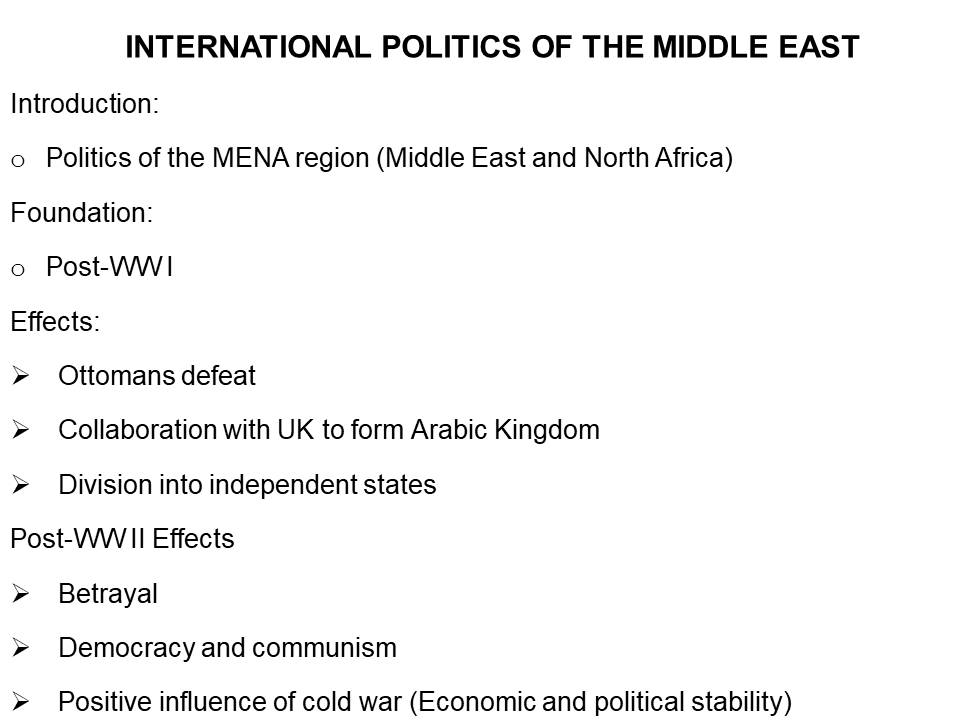
Cold war effects on diplomatic front
- Great Britain-US merge, compelling Soviet to honor talks.
- French takes a softer stand.
Why MENA region
- Resources (oil), trade-links, position (strategically):
- British enjoyed influence in MENA giving more economic support.
- MENA disliked Soviet.
- Soviet pondered the more favored British system to spur growth.
- MENA skeptic of British support.
Notes
Great Britain collaborated with the US to gang up against the threat of Soviet since it showed no urgency to withdraw from its previous colonies as per the diplomatic talks. However, the French were a bit relaxed on this. There was belief by the West that should the Great Britain and France discontinue there occupation, the Soviet Union would step up. The UK-France union sort to have its expansion of powers to the MENA region, graced with resources such as oil production, trade-links, and are strategically located. Colonization may have seemed to end, but the actual independence transition was still underway. The British dominated this area.
The system of Soviet Union was clearly not embraced vis-à-vis its rivals.’ Despite the economic support, MENA mistrusted British.
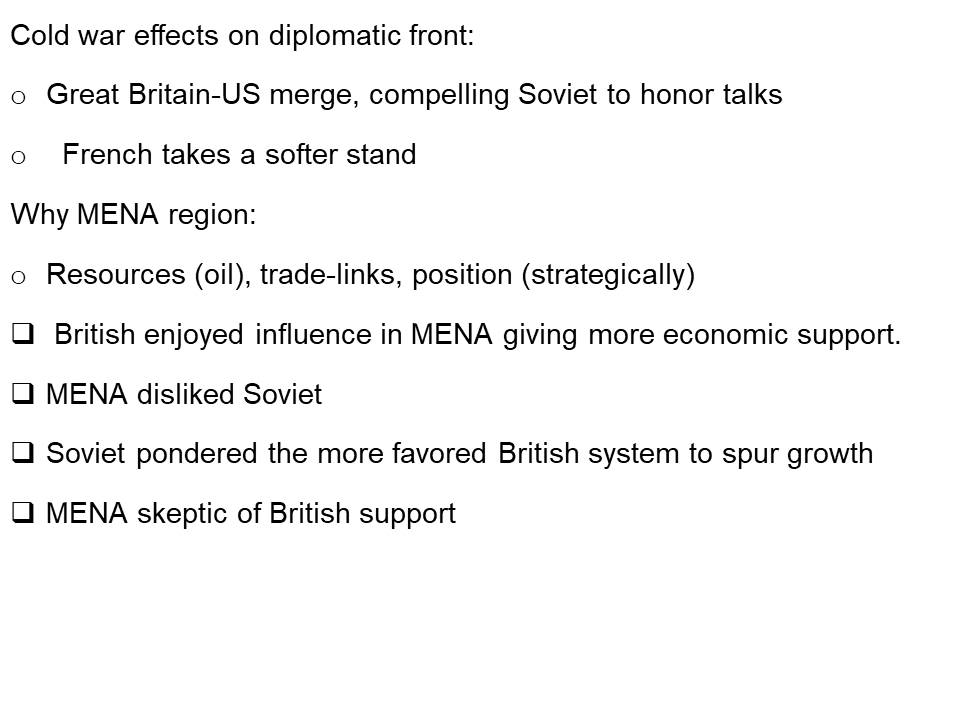
How is decolonization of French different?
- used direct rule.
- They had intentions to maintain and oversee help in package of the military support in mind.
French denied Muslims equal rights, prompting independence
Consequences of independence struggles:
- Bloodshed.
- Algeria and Tunisia became states.
- Joined Britain and the US to become ant-imperialists.
Relationship was delicate (since British and US were anti-communists).
Egypt’s Gamal maintained a balance between warring factions only to ditch communist-Soviet later.
Notes
The French explored a unique decolonization system. Unfortunately, the results experienced afterwards were akin to that of the British. The French used direct rule that entailed civilization missions, organization of the land partitioning methods among other leadership skills that directly reached the citizens. These cases were particularly in the North Africa.
According to Issawi (2013), the mentality and urge to be self-dependent was embraced by the North Africa from the early 1920s due to lack of trust on the French. The Muslims were denied equal rights prompting the fight for independence.
Following the challenge, bloodshed marred independence struggles. Consequently, Algeria and Tunisia attained independence. Algeria joined the British and American former colonies, becoming anti-imperialist. However, the alliance was delicately poised since the Britons loathed communism.
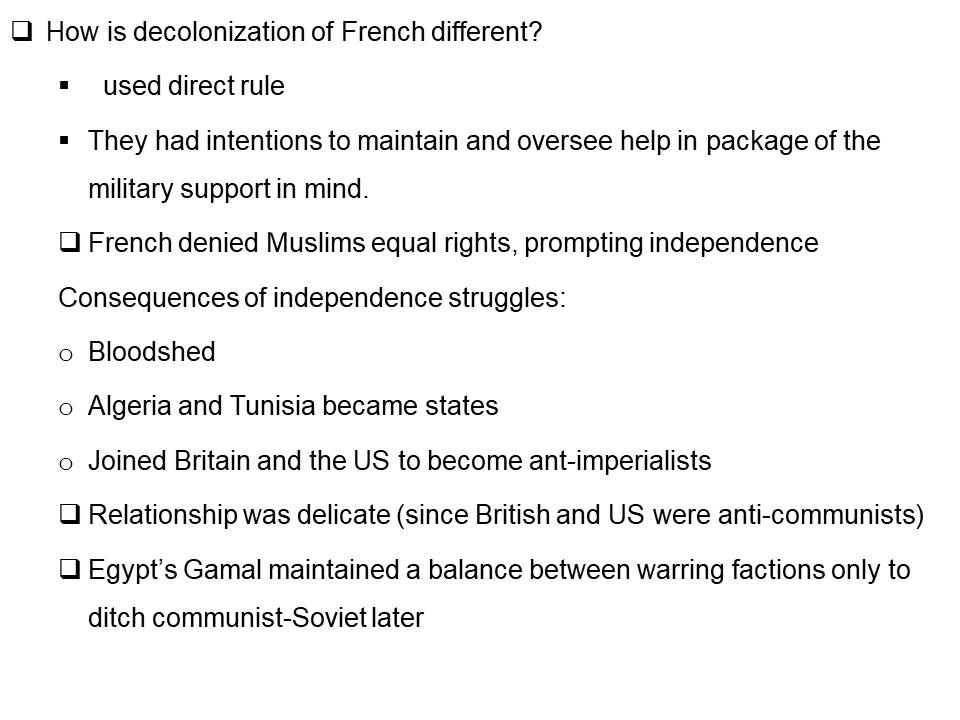
Americans desperate for support from North Africans
Americans outdo Soviet by encouraging Middle East states to merge by encouraging ‘CENTRY’ (Central Treaty Organization) to consolidate its superpower status.
These mind games are sustained to-date, characterized by poor governance/leadership.
The Americans could not count on the Egyptians, Tunisians and Libyans amongst other former colonies for their support and this was a desperate situation for them. On the other hand, the Soviet Union would get less attention from the same countries, but there was no guarantee. Organizations were formed from these countries which helped strengthen its ruling power from the leadership effects. There were formations of alliances such as the ‘Central Treaty Organization’ or ‘CENTRY.’ This organization consisted of the Iraq, United Kingdom, turkey and Pakistan.
The issues of power and political strategies began in the early 1920s in the MENA. Unfortunately, this issue is ongoing in the 21st century, promoting more issues that need to be addressed such as poor governance and leadership skills.
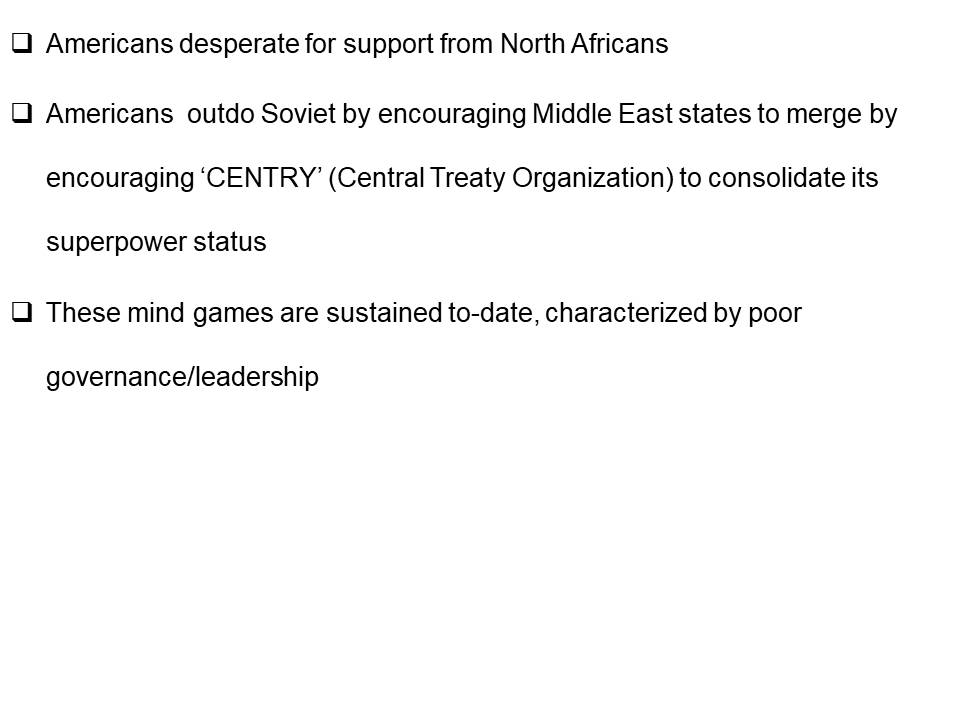
Question & Answer
Amid the Cold War Era, what did the developing tension between the United States and the Soviet Union eventuated to?
- The association of the Warsaw Pact.
- The intrusion of Hungary and Czechoslovakia.
- The Berlin Airlift.
- A settlement banning atomic tests.
- Correct Answer: Number D.
- Correct Answer: Number4.
Amid-1970’s, the US and Soviet joined hands to limit atomic weapons multiplication by forming the ABM (Antiballistic Missile Treaty) which banned space-based weapons.
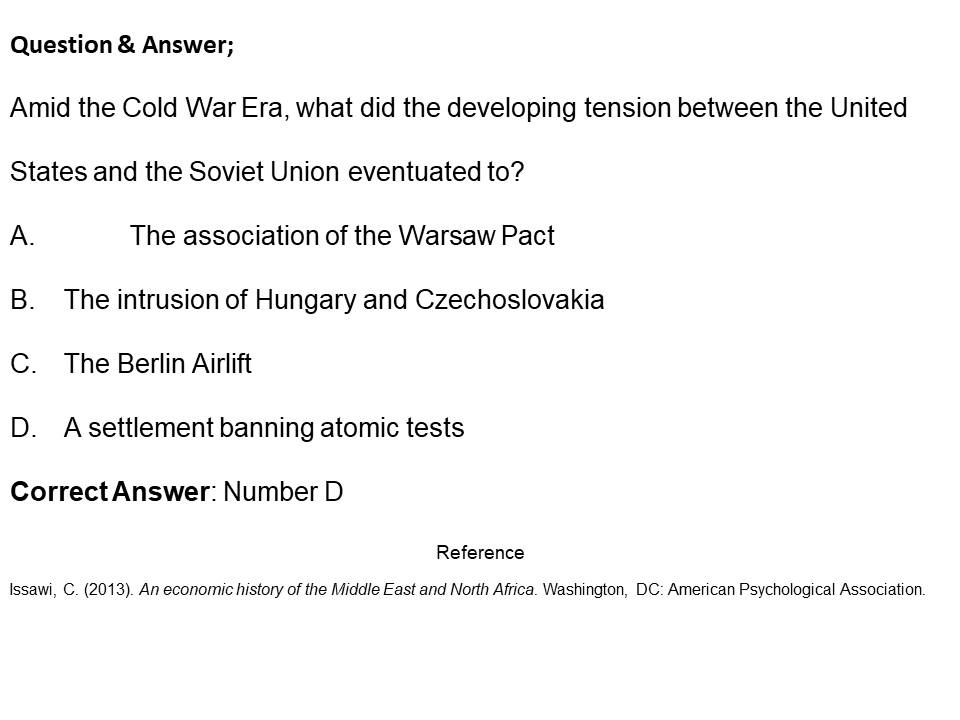
Reference
Issawi, C. (2013). An economic history of the Middle East and North Africa. Washington, DC: American Psychological Association.